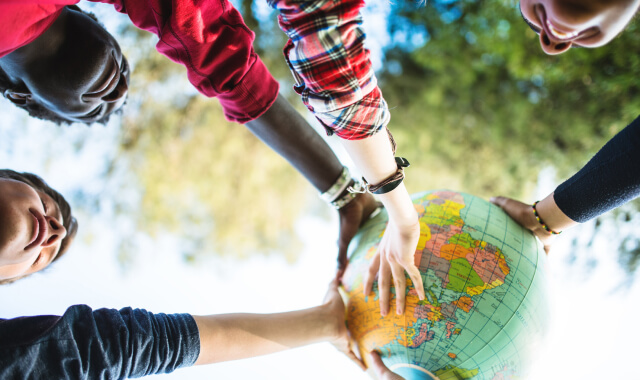Being in uncertainty is usually an enormous trigger of fear. The situation gives us a chance not to try to get rid of our fear, but to learn to integrate it. When we look at climate change, when we look at deep issues that come up in our world, we often think that what comes up in me is somehow an obstacle for me to be effective in the world.
I think the opposite is true. What comes up in us is part of the detoxification mechanism, part of evolution. The world is not only evolving outside of me, the world is also evolving within me, the world is evolving through all of us.
And the same with nature. When we walk through the forest, where is nature? Nature is not around us. I am also nature. I am also biosphere. So this sense of separation that we sometimes experience, it seems that what is happening inside me is excluded and there is the world outside. The world does not happen around us.
The world is happening through all of us. This is very important. Whatever we are going through is not for us to package and try not to have, it is exactly what we need to have in order to evolve as humanity and as life.
We cannot be in the uncertainty of not knowing. To let go in order to find new ground – that is quite a difficult step to take. It triggers all our fears.
We need more collective support. We need to support each other through the rough waters of this time. And we need to heal. Whatever is coming up in us is the unintegrated past knocking on our door and saying: I need to be seen.
Countries need a collective architecture of healing. Over time this would reduce our health care costs enormously and increase public wellbeing, if we could see that this is the unintegrated residue of many massive traumatizations and many things that we typically try to suppress.
And that would lead us to a world where restoration between different countries actually becomes a necessity, because we would see that the sand in the engine of evolution is the past that we don’t want to look at.
Once we understood that, we would be motivated to use our power to restore all the transgressions that we have inflicted on each other. We would see all the trauma that this has caused so that we can evolve and change our collective trajectory.
That is our responsibility to the future. Meaning: the responsibility to the future is to integrate the wounds of the past. So that we stop passing them on to our children and their children and so on. It is in our hands to stop this compulsion to repeat.
But it is not easy because what we have done to each other as a human race is painful. And increasing our communal capacity to be together with that pain and increasing our relational capacity to be together in that space is what makes the next generations happier. Thomas Hübl
“New Perspectives on Collective Healing, Social Justice, and Well-Being” is the title of a webinar series hosted by the UNESCO Routes of Enslaved Peoples Project, the Global Humanity for Peace Institute, and the University of Wales Trinity St. David. In this series, I enjoyed an inspiring conversation with Dr. Joy DeGruy, an internationally renowned researcher, educator, and the author of “Post Traumatic Slave Syndrome”. The text is an excerpts from the event. Thomas Hübl
Watch the complete conversation here:
